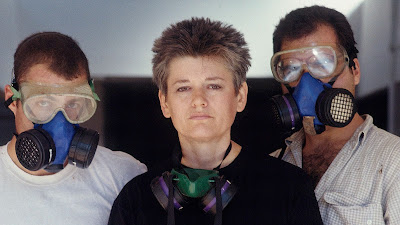Viewing the 2018 bio-doc -- just now getting a virtual theatrical release here in the USA -- about artist Fernando Botero proved a pretty bizarre experience.
While TrustMovies has watched and enjoyed bio-docs about all kind of artists, from those whose work he actively dislikes (Mark Kostabi) to those whose work he loves (Ursula von Rydingsvard), this may be the first time he's seen a bio-doc about someone whose work he doesn't care much about, one way or the other.
I've long imagined that Botero had made his mark on the art world by absolutely nailing, in his own adorable-if-repetitive manner, the increasing trend in our western world toward obesity. But, no -- the director of this film, Don Millar (shown at left), begins his movie with the following quote: "You can't go creating something that's a work of genius without first being controversial."
That controversy, as we haltingly learn during the course of the film, has to do with how the critical establishment tends to view his art. Which is not, shall we say, in high esteem. (The single naysaying critic we're allowed to hear from in this documentary refers to Botero's work as the Pillsbury Doughboy of art.)
Still, Botero (shown above, as a younger man), according to the film, is the artist with the most museum exhibitions in the world, has had the most books published about his art, and is the most popular living artist in the world. Which is rather like saying that, critically speaking, the Star Wars franchise ought to have won every Oscar in every category over the past few decades.
Via archival footage, we learn about the artist and of the automobile accident in which he lost his youngest child. In terms of crtical assessment (other than that Pillsbury reference), we hear mostly from family, friends and fans, some of which are indeed part of the art establishment, and who tell us of the artist's keen sense of humor that is included in much of his work, along with his consistently going back to the great masters -- from Piero della Francesco to da Vinci to Rubens -- and retooling their work in his own special style. We also learn how he moved from painting into sculpture.
Most interesting to me was seeing and hearing how various current events -- from the drug cartels and violence in his home country to the USA's prisoner torture in Abu Ghraib -- influenced his art. It is encouraging to see something other than his sunny colors and charmingly rotund figures for a change. (It does seem odd, though, that he can despise the torture in Iraq but not seem to mind that accorded to the bulls in the "art" of bullfighting.)
The film ends with a lovely gathering of Botero's extended family, just preceded by references to his many contributions to museums -- of his own work and that of other artists -- as well as a look at his famous sculpture of The Dove, which was deliberately bombed, and which he decided to leave on display with its damage intact, while placing a new Dove sculpture right next to it.
Despite the barely camouflaged hagiography on near-constant display, the film does offers a lot of information about Botero. But for me, the artist's non-stop, in-your-face, fat, flat stylization remains a deal-breaker. The unintentionally funniest moment in the film comes as one of his fans explains that his work is so much more than merely "a recognizable style. After all, Hello Kitty has a recognizable style." Exactly.
From Corinth Films and running 83 minutes, the documentary opened in virtual theatrical release earlier this month. Click here to view a list of virtual playdates, cities and theaters.























































